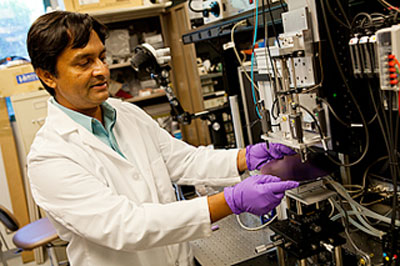| Sep 17, 2012 |
Cutting-edge startup aims for nano-close shave
|
|
(Nanowerk News) A new startup company at UC Davis aims to bring you a better shave through semiconductor manufacturing technology. Nano-Sharp Inc. plans to use silicon wafers to make razor blades and surgical tools far more cheaply than current silicon or ceramic blades.
|
|
It's one of three new companies in the College of Engineering's incubator, the Engineering Translational Technology Center. The new businesses hope to grow into viable companies that attract private funding.
|
|
"Every single one of these companies is looking at a multibillion dollar market," said Jim Olson, the center's business specialist and a visiting assistant professor at the UC Davis Graduate School of Management.
|
 |
| Nano-Sharp co-founder Saif Islam, a UC Davis engineering professor, loads a silicon wafer into a machine that etches razor patterns.
|
|
Nano-Sharp co-founder Saif Islam, professor of electrical and computer engineering, said that inspiration came when his team was working on making solar cells from silicon wafers. They were etching the wafers to create thin vertical walls standing up from the surface.
|
|
"We accidentally made some 'bad' walls that were very sharp," he said. "We realized that we could mount them and use them as blades."
|
|
Ceramic or silicon blades are extremely sharp and keep an edge much longer than metal blades. But they are very expensive, so their use is limited to high-end kitchen knives and surgical tools. For example, a ceramic scalpel for eye surgery costs about $600, Islam said.
|
|
Conventional blades are made by sharpening the edge of a silicon wafer, Islam said. In contrast, his new, patented technique creates blades across the surface of the wafer.
|
|
The cutting edge of the blade is just a few atoms across, Islam said. "They have atomic sharpness approaching that of a diamond blade that metal blades cannot exhibit."
|
|
The performance of these crystalline blades can be improved using technologies developed by the semiconductor industry over the last 50 years, Islam said.
|
|
Islam recently won a Proof of Concept award from the University of California to develop a prototype to attract private investors to back the company.
|
|
Co-founders of the company are Logeeswaran V. Jayaraman, postdoctoral researcher in Islam's laboratory, and David Horsley, professor of mechanical and aerospace engineering.
|

